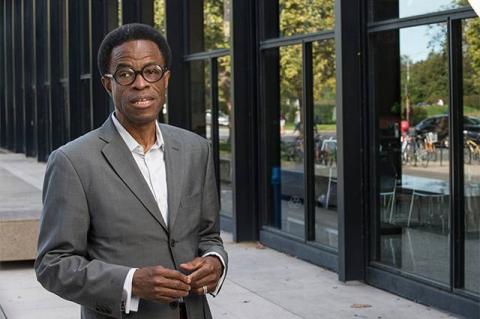Understanding the Positive Impacts of African American Fathers
Waldo E. Johnson, Jr. attempts to better understand the complex composition and inner-workings of fragile, non-traditional families
By Charles Whitaker
VOLUME 25 | ISSUE 1 | SPRING 2018

ABSTRACT
Associate Professor Waldo E. Johnson, Jr.'s groundbreaking research on fathers, and in particular his work around African American fathers and black male development, is important. His work is helping to break down stereotypes and assumptions about the roles of fathers and is challenging conventional wisdom about how fragile, non-traditional families can be helped by programs and policies. Johnson is leading a federally financed study in Chicago to promote positive behaviors, such as healthy eating, and discourage antisocial behavior, such as drug abuse and smoking, by building the bonds between non-resident fathers and their pre-adolescent sons. He is also leading another study of how men (mentors, fathers, or family members) communicate with teenaged boys about safety. The work is intended to help create a curriculum to guide fathers in ways to help their sons avoid violence.
_____________________________________________________________________________________________________________________

For the better part of the twentieth century, scholars took a dim view of studying parenthood through the lens of fathers. The limited extent to which researchers did examine fathers and their role in the development of their children largely was done by collecting data from mothers. This was especially true of studies that attempted to determine the influence of absent fathers—men who by dint of divorce or some other disruption did not live with their children.
"Fathers were thought of mostly as instrumental providers," says SSA Associate Professor Waldo E. Johnson, Jr., who has been deeply immersed in the study of fathers and families for more than two decades. "So when trying to understand fathers' impact on children—particularly non-resident fathers—the default approach was to gather responses from mothers who became proxies for learning about a father's involvement or lack of involvement. There was just this broad agreement that these men were not around, so you couldn't collect data from them," says Johnson, who is launching two new studies of fathers and sons in Chicago. The studies take advantage of his interest in combining quantitative and qualitative research to gain a deeper understanding of the relationships he studies.
Johnson was among the early scholars who stepped in to challenge conventional wisdom about fathers. His line of inquiry began with attempts to better understand the complex composition and inner-workings of fragile, non-traditional families—families that did not look like the Western, and largely white, middle-class ideal on which so many of the assumptions researchers made about families were based. Almost from the start of his academic career, Johnson questioned the notion that the role of fathers was primarily transactional, whether they were present in the home or not. Employing a qualitative approach to enhance traditional survey research, he helped unpack layers of nuance in family structures across the spectrum of urban households and offered a new understanding of fathers' roles in child development and the social forces that impact how fathers assume those roles in a variety of urban contexts.
"When you began to look at context and think about how socio-economic status shapes the interplay in families, you come away with a different understanding of how these families work." Johnson says. "You realize that you cannot assume that a father's absence means non-involvement. Simply because a father does not live in the household does not necessarily mean that he does not have any involvement."
He notes that for years institutional barriers, like policies related to a mother's access to financial assistance through Aid to Families with Dependent Children (AFDC) or Temporary Assistance for Needy Families (TANF), were predicated on the assumption of an absent father and effectively discouraged men in poor communities from being officially present in the home for fear of jeopardizing the government resources available to needy mothers. Fathers' involvement in that context looked very different than in more middle-class families, and it took an astute researcher or social worker to recognize. Johnson, who earned his MSW from the University of Michigan before he embarked on a career in the academy, says that he, too, often failed to appreciate the difference.
"Even I, as a social work practitioner, would go into these households where the men had made themselves scarce and make assumptions about what that meant about their involvement as fathers," he says.
His early research on the complex roles of fathers in these families changed his perspective and the trajectory of his career. While Johnson readily admits that he was not the first scholar to mine this landscape, many observers acknowledge that the field was relatively new when he began doing his groundbreaking work.
"Waldo's focus on fathers, and in particular his work around African-American fathers and black male development, is important because there was so much misinformation out there," says SSA Interim Dean Deborah Gorman-Smith, the Emily Klein Gidwitz Professor. "We had a lot of programs and policies that were based on stereotypes and assumptions rather than on quality data.

Currently, Johnson, who also serves as a faculty affiliate in the University of Chicago's Center for the Study of Race, Politics and Culture, is involved in two multi-year participatory studies that advance the work on fathers that he has been engaged in since he earned his Ph.D. from SSA in 1993. Both studies focus on fathers and sons and how the enactment of masculine roles in urban settings shape the trajectories of young, black men. Both studies are built around the evaluation of interventions designed to help fathers and sons (pre-adolescents in one study, adolescents and older in the other) cultivate relationships that could lead to more positive outcomes.
The Chicago Fathers and Sons Project, for which Johnson is co-investigator, is a longitudinal, five-year study funded by the National Institute of Child Health and Human Development. Its aim is to promote healthy eating and thwart antisocial behavior like drug abuse, smoking, and too-early initiation of sex by strengthening the bonds between non-resident black fathers and their pre-adolescent sons (ages 8-12).
Modeled on a similar study initiated in 2004 in Flint, MI, by principal investigator Cleopatra Caldwell, chair of the Department of Health Behavior and Health Education at the University of Michigan, the program enrolls dyads of fathers and sons in a curriculum designed by Caldwell that promotes good eating habits as well as healthier attitudes toward talking about difficult subjects like sex, substance abuse, and gang involvement. The outcomes in Flint have been so positive that Caldwell looked to replicate the results in a major city where researchers could take the analysis to another level. When she and her team decided that Chicago would be a perfect location, Caldwell turned to Johnson, whom she’d met decades earlier when Johnson was a post-doctoral fellow at Michigan.

Associate Professor Waldo E. Johnson, Jr. is heading two research projects to better understand the role of black fathers
___________________________________________________________

During his time in Michigan, Johnson and Caldwell had bonded over their shared research interests and their deep desire to find ways to bolster fragile urban families. And over the years, Caldwell had long admired Johnson’s commitment to dispelling some the myths that prevailed in the literature about non-resident fathers.
“I think Dr. Johnson’s work has been critical in showing us that fathers matter—even when they are non-resident fathers,” Caldwell says. “He has shown us that there has long been a bias in the system when it comes to studying the impact of non-resident fathers. They’ve been invisible for the most part. But he has shown us that family is not just about mothers and children, with fathers there just as providers. Fathers are a critical part of family, too.”
The Chicago Fathers and Sons Project got underway in earnest in August when researchers began recruiting 400 father/son pairs from the Washington Park neighborhood on the South Side. The KLEO Community Family Life Center, a non-profit organization dedicated to the prevention of domestic abuse, aided in the recruitment. Half of the study participants are enrolled either in a “treatment” group, where they are fully engaged in the Caldwell-designed curriculum; the other half are enrolled in a comparison group that gets a less robust intervention.
In designing the study and recruiting participants, Johnson said the Flint researchers early on realized that they were faced with an ethical dilemma. They knew that they needed the power of numbers to do a statistically significant analysis of the effects of the treatment. Yet, knowing that all of the families recruited for the study were in need of some form of intervention to curb the ill-effects of their impoverished surroundings, the researchers felt that it was unconscionable not to provide the participants in the comparison group with some form of intervention, even if it did not have the scope of the curriculum provided to the treatment group. And while the treatment group in Flint has experienced tremendous success in terms of fathers’ ability to curb the negative influences of peers and engage in positive conversations around health, the comparison group has also experienced some positive results, such as fathers’ reporting that they had curtailed some of their negative behavior, like smoking and drug use.
_____________________________________________________________________________________________________________________

The second study occupying much of Johnson’s time examines “Father-Son Communication about Violence & Safety in Urban, African-American Communities,” undertaken with Lauren Rich, an economist, human development scholar, and senior researcher at Chapin Hall, who also was one of Johnson’s colleagues during his post-doc work at Michigan. Here the aim is to chronicle the range of conversations that take place between fathers (or father figures) and sons about how to remain safe in a context where the threat of violence comes from multiple sources, ranging from street gangs to law enforcement.
In the wake of the high-profile episodes in which young black men were killed by police—from Michael Brown in Ferguson, MO to Laquan McDonald in Chicago—the popular press was filled with essays by African American mothers recounting “the talk” they have with their sons about how to safely navigate the streets. Johnson and Rich conceived a study that attempts to understand how fathers enter into this conversation with their sons. Anecdotally, there is evidence that fathers also talk to their sons about safety but, as is often the case regarding the literature on black fathers, there is little scholarly documentation of the phenomenon.
The participants are men (they needn’t be biological fathers—they could be mentors or other family members) and “sons,” age 13–20. They come from several Chicago neighborhoods with high rates of violence, including Englewood, Roseland, Grand Boulevard, North Lawndale, and Garfield Park. The purpose is to gain a greater understanding of the ways in which these men have remained safe in these neighborhoods and how they communicate those tactics to the young men in their charge.
“We think that’s important because dads are navigating these spaces in very different ways than moms, but we have very little sense of the strategies they’ve used,” Johnson says.
The project, which is still in its pilot stage, includes 40 father-son pairs. Researchers ask each pair the same set of questions in an effort to understand the nature of the relationships and the effectiveness of the conversations. The idea is to develop a curriculum based on the findings that would assist fathers in helping their sons avoid violence and promote safety across multiple domains.
Both of the studies Johnson is engaged in employ the intense community immersion that is the methodological hallmark of much of his work. While the results of large-scale surveys had for decades been the preferred methodology for gathering information on fathers, Johnson has long held that augmenting that data with qualitative research provides far richer and more illuminating portraits of these men and the societal phenomena that motivate and agitate them.
“The survey work is extremely important in helping us understand some of the demographics of the population, but there’s still things we can’t answer as researchers by solely focusing on that,” Johnson says. “So when it came to trying to understand non-resident and unwed fathers and what was often perceived to be their lack of engagement, I’ve always felt that examining these men from a qualitative perspective rather than just through the large survey allows us to look at them more closely. A lot of those kinds of questions we have about these families can’t always be answered quantitatively. But qualitative work, in combination with survey work, can help us explain a lot.”
That mixed methodological approach is, many say, what distinguishes Johnson’s work.
“I think what’s unique about Waldo’s work—and this, I think is the strength of social work research, in general—is that he looks at those large contextual factors and how they influence child development as well as how they influence father-son relationships. He looks beyond the big data sets and tries to understand through deep qualitative analysis how race and institutional racism are support for and barriers to those relationships. He helped change the field and the way others think about and approach this work,” says Gorman-Smith.
_____________________________________________________________________________________________________________________

Nothing in Johnson's own upbringing suggested that social work scholarship would be his career path. A native of Americus, GA, his father, supported his son's academic leanings, but allowed him to chart his own path. "He was very much an advocate for education," Johnson recalls, "but he was not someone who wanted me to go in any particular direction professionally."
Initially, Johnson thought he was destined for a career in law, but after taking the LSAT as a senior at Mercer University in Macon, GA, he had an epiphany: He realized he wasn't really interested in becoming an attorney. He shared his new revelation (and the accompanying angst) with his college advisor, who after hearing the kinds of things Johnson was interested in doing, introduced him to an African American male social worker in Macon, which led to another meeting with the president of the National Association of Black Social Workers, who also happened to be an African American man. Those encounters set Johnson off on a new path, and before long he was off to the MSW program at the University of Michigan.
Following Michigan, he landed a job in Chicago as the first director of national programs for Alpha Phi Alpha Fraternity, where he helped shepherd Project Alpha, a program designed to stem what at the time was the rising tide of teen pregnancies. It was that work that spurred him to think about the influence of parents, fathers in particular, on children's outcomes.
"I began to think about the importance of parents, and I felt the need to be better trained in evaluating and assessing programs and policies directed at parents," he says. "But that was something that was beyond my skillset at the time, so that was part of my reasoning for enrolling in SSA.”
It was his dissertation research that led him to explore fatherhood. He focused on young fathers and the discord between what they said they were going to do as parents before the birth of their children and how they actually behaved as fathers. The in-depth interviews became one of his preferred methodological tools.
After completing his post-doc at Michigan, he joined the SSA faculty in 1996 and immediately established himself not only as an enterprising scholar, but also as a gracious and influential teacher and mentor. “Waldo provides more service to SSA and the University than almost any other faculty member we have,” says Gorman-Smith. “He is looked to by so many of our students for his wisdom.”
Pamela Brown, AM ’97, says that when she met Johnson during his second year on the job, she and her peers had no idea that he was a junior faculty member. “He seemed like such a seasoned professor,” Brown says.
Brown, who was a member of the SSA African-American Student Association, for which Johnson served as faculty adviser, said that students flocked to Johnson for all sorts of counseling— personal, professional, and academic—and he always provided a sensitive ear or a shoulder to cry on.
“At the end of my first year, my mother died unexpectedly,” Brown says. “I was distraught. I was so upset I didn’t quite know what to do or how to function. But Dr. Johnson was there to walk me through it. He said don’t sign any papers or make any big moves until after you graduate. He was just so wise. He knew a little bit about a lot of things.”
His colleagues also flock to Johnson for his empirical know-how as well as his collaborative spirit. Cleo Caldwell says that among the many qualities that led her to collaborate with Johnson on the Chicago Fathers and Sons Project was his deep community connections, forged over 20 years of building relationships among scholars and in the community. “I’ve always been impressed by how resourceful he is,” Caldwell says. “He is a natural at networking, and he knows everyone.”
While he has his hands full with teaching and the two studies that currently occupy him, Johnson says he’s always has an eye out for the next project.
“One of the things that I’ve done throughout my academic career is allow the research to take me to the next level,” he says. “I always try to figure out where does this information lead? That doesn’t mean that I’m idling. I’m thinking about things all the time. I’ve got a million projects in my head.”